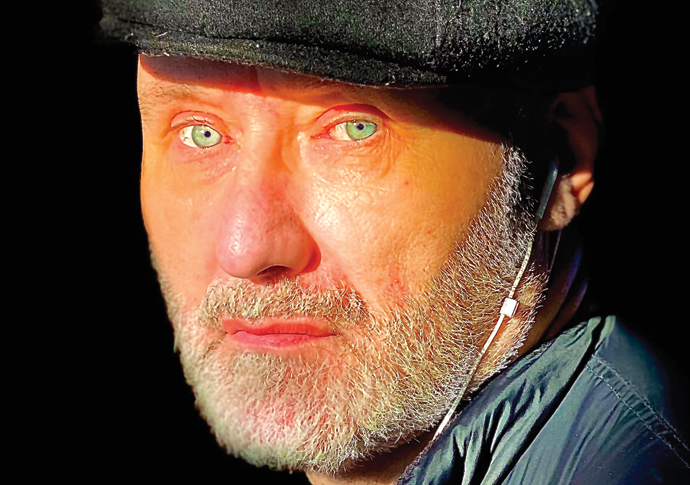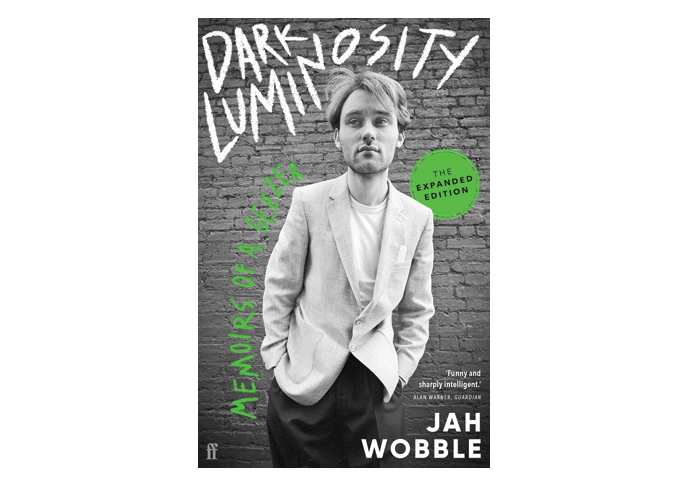Wobbling free
One of Britain’s top bass players offers an entertaining and illuminating memoir, says George Binette
Thursday, 21st March — By George Binette

John Wardle AKA Jah Wobble, author of Dark Luminosity
THERE is no dearth of memoirs from former pop stars and musicians who once featured in the charts. Books generated by such careers make for a publishing sub-genre with many volumes clearly ghost-written and a fair few nothing more than literary dross fit for rapid recycling.
Dark Luminosity provides a shining exception. Originally published in 2009 by Faber & Faber (would ex-editor TS Eliot have spun in his Somerset grave?), the current book is a revised and expanded version of earlier reflections on the life and times of John Joseph Wardle, born in Stepney, east London in August 1958.
Wardle is far better known as Jah Wobble, one of Britain’s most innovative and widely recognised bass guitarists, who first emerged in the late 1970s as part of John Lydon’s post-Sex Pistols band, Public Image Limited (PiL).
Like another key figure from the post-punk period, Slits’ guitarist Viv Albertine (another Faber-published author), Wobble has an exceptional command of English prose. Coincidentally, they share strong Camden connections from their respective teenage years with Wobble attending the then Kingsway further education college (now part of Capital City College group), where he acquired the sobriquet that became his stage name.
While Albertine focuses on the sexism and overt misogyny she faced as a groundbreaking female musician, Wobble writes with acuity about the hidden psychic injuries of social class as well as the harsh reality of “pre-NHS days,” which may have caused the death of his father’s eight-year-old brother.
During John Wardle’s seminal year at Kingsway, he met and struck up friendships with three other lads named John. The self-styled “Four Johns” consisted of John Beverley, who would become the notorious Sid Vicious and in a drunken state mangled the pronunciation of Wardle’s name into “Jah Wobble,” John Gray, a voracious reader and something of a cultural compass, and, crucially, John Lydon (AKA Johnny Rotten soon after his departure from Kingsway).
With PiL’s second album, Metal Box, Wobble’s dub reggae-influenced bass helped define a sound that defied easy categorisation, building an aural bridge between post-punk and the musical avant garde that is at once jarring and enthralling 45 years since its release. Less than a year later, he was excommunicated from the band, which came as little surprise, given what he saw as PiL’s creative torpor combined with his barely concealed anger at guitarist Keith Levene’s spiralling heroin addiction and the band’s distinctly dodgy financial arrangements.
The split from PiL failed to bring Wobble, still only 22, either material security or inner peace even as he had the opportunity to plough his own musical furrow.

Despite creative freedom and modest commercial success with his own band, Invaders of the Heart, Wobble’s life began to unravel as he sank into alcoholism, with abusive drinking and increasing use of cocaine and speed fuelling violent outbursts and damaging a long-standing relationship.
Wobble is something of an incorrigible practical joker even many years after going sober, but he litters sections of the book with tragicomic tales of destructive excess.
He notes perceptively that “I had gone backwards in regard to emotional development… In many respects I was more sensible at 18 than I was at 25.”
In late October 1986, having acknowledged the scale and devastating impact of his addiction, Wobble stopped drinking (and drugging) with the support of a local AA group in the East End, years before the “celebrity rehab industry”.
He sold his bass and for the next two years he withdrew almost completely from the “music business,” finding work initially as a van driver and then later on London Underground, first as a ticket collector (remember those?) then as a Northern line guard and eventually as a train driver. By late 1988, he felt ready, indeed compelled, to return to music in earnest, leading to a second incarnation of Invaders of the Heart, who produced a top 40 hit in 1992, the ethereal Visions of You, with vocal backing from the late Sinead O’Connor.
This was just one of many collaborations with musicians ranging from Brian Eno to Baba Maal and even U2’s The Edge.
Wobble is dismissive of most of the musical output associated with British punk’s brief heyday. But in hindsight he sees “the punk phenomenon allowed for a sort of misfits’ charter”.
To him his age cohort was “an ‘end of the line’ generation: the last lot to grow up in a society still relatively untarnished by free-market economics and monetarism. We had our adolescence at a particularly turbulent time, politically speaking, in the nation’s history.”
In contrast to his surviving compatriots from this period, Wobble sees himself as clinging to “left-wing humanitarian values”. Partly out of friendship, partly out of hatred of Thatcher and Murdoch he joined pickets of the Wapping printworks. He expresses some disappointment but little surprise at the trajectory of his former friend and bandmate, John Lydon, who once wrote “lyrics on a par with Samuel Beckett” only to become “a cheerleader for Brexit and Donald Trump”.
Given my own age and musical tastes, Wobble’s account was always going to be of interest, but both the quality of his writing and his unflinching honest surpassed my expectations. The passages describing his nigh mystical communion with the bass were both intriguing and baffling, but the opening chapters recounting a post-war East End childhood and adolescence resonated with a poignance, shorn of sentimentality.
• Dark Luminosity: Memoirs of a Geezer. By Jah Wobble, Faber & Faber, £12.99
• George Binette, former Camden Unison secretary, attended PiL’s first US gig
• Jah Wobble will be discussing his memoirs with Ted Kessler at The Social, 5 Little Portland St, W1W 7JD tomorrow (Friday) at 6pm, £12, tickets: thenewcue.co.uk